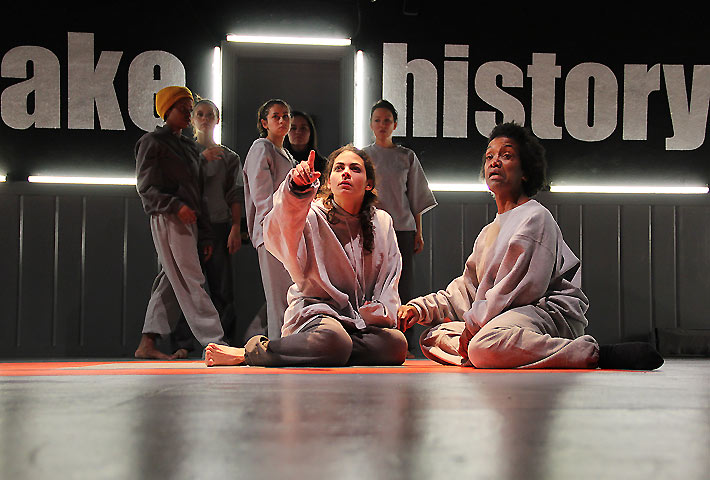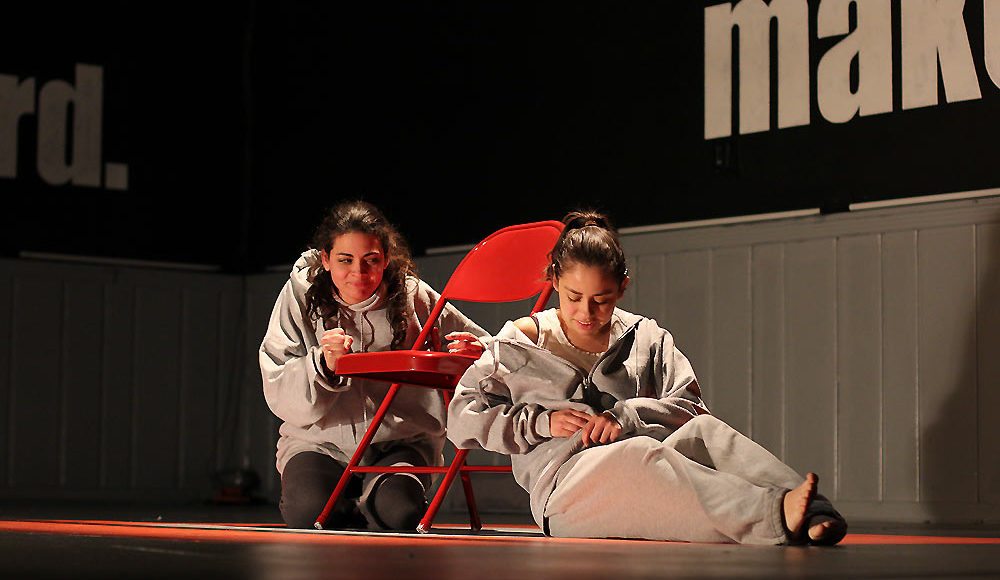There is a great deal about Swarm Cell which is commendable….
Now you know with an opening line like the one above what inevitably must follow. And it is true that there is a great deal about Swarm Cell which must be faulted.
The show features a youngish cast, with the script credited to Gabriel Rivas Gomez “with contributions from students at Fairfax High School.”
Indeed, the show has the overall feeling of a youthful endeavor about it. It evokes idealism, passion and imagination.
The story is a construct of “Grapes of Wrath” meets “1984,” or at least that Apple Super Bowl commercial of a few years passed.
Tomasina (Mariana Montes) is pregnant and barely surviving in a landscape that may be somewhere in our future or a reflection of our reality today to which we’re turned a blind-eye.
She encounters K.C. a mute carved from the same material as John Singer in Carson McCullers’ “The Heart is a Lonely Hunter.“
Together they travel in constant fear of their “illegal” status being discovered until they come upon the Company, a quasi-multi-national corporation that is obsessed with putting out their products at the lowest cost and view their employees with a jaundiced pre-Haymarket eye.
There Tomasina comes under the dual sway of two polar opposite stars, each of which tries to drag her into their gravitational pull.
There is Cadabra (Caro Zeller), the ruthless manager whose only concern is with the “bottom dollar,” and towards that end is continually cutting what her workers earn while simultaneously raising demands on their productivity.
Pulling Tomasina towards her better angels is Ma Joad (Diana Elizabeth Jordan), a nurturing soul who treats all her co-laborers like her children and sees a greatness in Tomasina that the girl, herself, is blind to.
There is the premise of the play.
It is the story of an age-old conflict that has been with us from the beginning and will likely be with us at the end.
The show does not resolve any of the great problems it places before us on stage, but neither did Socrates, Marx, Hobbes or even Calvin for that matter.
The hope of a solution that the piece hints at is the stuff of youth, which means it is both endearing and dismissible.
What succeeds quite wonderfully is the staging.
Victoria Petrovich has provided a set that is both stark and intriguing. Lighting designer José López has done a superb job, and John Zalewski, whose work is always of a high level, has outdone himself with a sound design that functions like a reverberating silken web in its layering of the play’s action.
Robert Castro is credited as the director, but Jason Bruffy is in the program as Producing Director. I’m not quite sure what that means, but one or the other, or perhaps both, have managed to imbue the action with a diamond sharp precision that moves about the stage with an elegance approaching dance.
As most of the merits of the piece stem from the vigor of youth, so do most of its failings, which arise from a youthful vagueness.
One surface example of this is found in the inexactness of handbills and programs, wherein the one sets the play “twenty-five years into the future” while the other sets the play “Right here. Right Now.” You may dismiss this as inconsequential, and you would be not just wrong, but “tyro” wrong.
On such minor points are master works won and lost.
The story and the characters lack definition and depth, as do most of the performances, with the sole exception of Zeller as the tortured functionary of the company.

Front l-r: Maritxell Carrero (Tomasina), Diana Elizabeth Jordan (Ma Joad), Rear: Ensemble – Photo by Marjorie LeWit
On the night I attended, Montes was filling in for Maritxell Carrero in the lead role. That being said, I found Montes’ performance all of a single level, which is the fault of actor and director, and her character underdeveloped the fault of which we shall lay at the playwright’s feet.
Inclusiveness is a hallmark of the young, and it is present in this show to a noticeable degree. Yet, here that inclusiveness injects more murkiness into the evening than clarity.
One instance can be found in the performance of the mute K.C. who communicates almost exclusively by signing. I was at a loss to decide if McPeek was actually using ASL or just flapping her hands about. Whether sloppiness or fakery it needed to be addressed.
As Ma Joad, Jordan has the second most prominent speaking part. Jordan appears older than the rest of the cast, and this example of inclusiveness is to be applauded. Regrettably she needed help on her diction which was not given her, resulting in her performance being all but incomprehensible to myself and a number of others in the audience.
This, sadly, is a failing of a director’s two primary responsibilities; it is a failure to communicate to the audience, and it is a failure to serve as midwife to an actor’s performance, the more grievous sin being the latter.
Still, all the flaws visible on stage do not succeed in obscuring the potential of the ensemble or the artists present.
What doesn’t work here does not manifest itself due to a lack of talent, but rather from a less than demanding application of talent.
It is a quality of the young to be smug.
Experience teaches us to never be content and to consistently demand more of ourselves.
A few more miles down the road, a few more dents in the chassis and with the dust of time settled on them, I would expect stronger work of all involved here.
♦ ♦ ♦
Final Weekend to see (February 26 – 28th)
SWARM CELL
At The Greenway Court Theatre
544 N Fairfax, Los Angeles, 90036
Performances are Friday’s and Saturday’s at 8 PM, Sunday’s at 7PM
Tickets are available at boxoffice@greenwayarts.org
or by calling 323-655-7679





